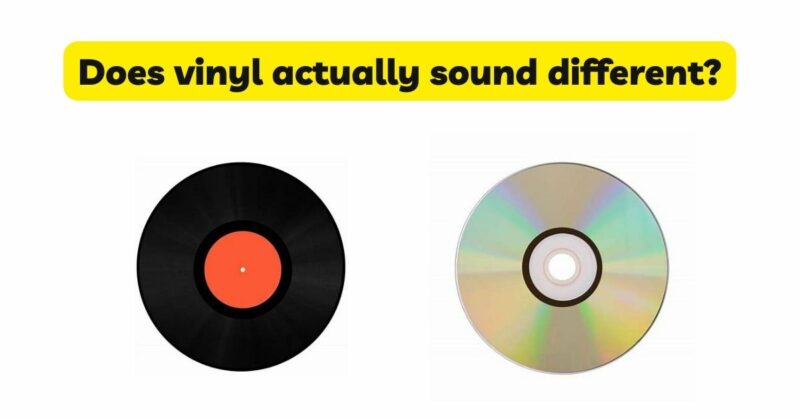Vinyl records have made a remarkable resurgence in popularity, captivating music enthusiasts with their nostalgic appeal and tactile nature. One common belief among vinyl enthusiasts is that vinyl records offer a distinct and superior sound compared to digital formats. In this article, we will delve into the question of whether vinyl actually sounds different from digital, exploring the technical aspects, subjective perception, and scientific studies that shed light on this intriguing topic.
- Understanding the Technical Differences: To assess whether vinyl sounds different from digital, it is crucial to understand the technical disparities between the two formats. Vinyl records rely on analog playback, where grooves on the record are physically traced by a stylus, generating electrical signals that are amplified and reproduced as sound. Digital formats, on the other hand, convert audio into a series of binary digits (0s and 1s), which are then processed and reconstructed into an analog signal for playback.
- Subjective Perception of Sound: The perception of sound is highly subjective and influenced by individual preferences, listening experience, and personal biases. Factors such as the listener’s familiarity with different formats, the quality of the audio equipment, the listening environment, and the listener’s mindset can all affect their perception of whether vinyl sounds different from digital.
- Analog Characteristics of Vinyl: Vinyl enthusiasts argue that the analog nature of vinyl playback imparts a unique warmth, depth, and character to the sound that digital formats struggle to replicate. The inherent imperfections of vinyl, such as surface noise, pops, and crackles, contribute to its distinct sonic signature. Some listeners find these analog characteristics appealing and believe that they enhance the listening experience.
- Digital Accuracy and Fidelity: Digital formats, such as CDs and high-resolution audio files, have made significant advancements in recent years, offering high levels of accuracy and fidelity. With higher bit depths, sampling rates, and improvements in digital-to-analog conversion technology, digital audio can achieve precise reproduction, wide dynamic range, and accurate frequency response. These advancements challenge the notion that vinyl inherently offers a superior sound quality.
- Scientific Studies and Blind Listening Tests: Scientific studies and blind listening tests have been conducted to investigate the perceived differences between vinyl and digital audio. Results from these studies have been mixed, with some participants claiming to hear distinct differences, while others could not reliably identify the format. These studies suggest that the ability to perceive a difference between vinyl and digital audio varies among individuals and is influenced by subjective factors.
- Equipment and System Setup: The quality of audio equipment and the setup of the playback system play a significant role in the perceived differences between vinyl and digital audio. High-quality turntables, cartridges, amplifiers, and speakers, along with proper setup and calibration, can enhance the nuances and subtleties of vinyl playback. Similarly, a well-designed digital audio setup, including high-resolution digital-to-analog converters (DACs) and quality speakers or headphones, can provide accurate and transparent digital audio reproduction.
- Listener Experience and Training: Listeners with extensive experience and training in audio production, engineering, or music performance may have a heightened ability to discern subtle differences in sound quality. Familiarity with specific recordings, genres, and listening to various audio systems over time can sharpen the listener’s perception and sensitivity to nuances. However, the general population may not possess the same level of discernment.
- Psychological Factors and Expectations: Psychological factors, such as expectations and biases, can influence the perception of whether vinyl sounds different from digital. The nostalgia associated with vinyl, the tactile experience of handling records, and the rituals of vinyl playback can create positive biases and heighten the enjoyment of the listening experience. Additionally, preconceived notions about the superiority of vinyl can influence one’s perception, regardlessof the actual sonic differences between vinyl and digital.
- Variability in Vinyl Pressings and Condition: It is important to note that the sound quality of vinyl can vary depending on the pressing quality and the condition of the record itself. Variations in vinyl manufacturing processes, mastering techniques, and the overall condition of the record can introduce inconsistencies in sound quality. This variability makes it difficult to make broad generalizations about the sound of vinyl as a whole.
- Personal Enjoyment and Engagement: Ultimately, the perception of whether vinyl sounds different from digital is highly subjective and influenced by personal enjoyment and engagement with the medium. For many, the act of handling vinyl records, examining artwork, and engaging in the vinyl ritual adds an additional layer of enjoyment and emotional connection to the music. This personal engagement can enhance the perception that vinyl sounds different and provides a more immersive listening experience.
Conclusion: The question of whether vinyl actually sounds different from digital is a complex and nuanced topic. While some listeners claim to hear distinct sonic differences, scientific studies and blind tests have produced mixed results. The subjective perception of sound quality, variability in vinyl pressings and condition, the advancements in digital audio technology, and personal biases all contribute to the ongoing debate.Ultimately, the enjoyment derived from vinyl playback goes beyond the technical aspects of sound quality. The tactile experience, nostalgia, and personal engagement with vinyl records create a unique and immersive listening experience for many enthusiasts. Whether vinyl truly sounds different from digital is subjective and varies among individuals. It is the listener’s personal enjoyment, emotional connection, and preferences that define whether vinyl holds a special sonic allure in their musical journey.


